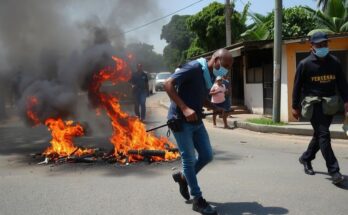The Dominican Republic plans to deport 10,000 undocumented Haitians weekly, responding to the challenges of excessive migrant populations amidst escalating gang violence in Haiti. This initiative is part of a wider strategy to manage migration and human trafficking at the border, driven by a failure of international efforts to restore order in Haiti, which has seen over 3,600 killings this year due to gang violence.
On Wednesday, the Dominican Republic announced a significant escalation in its immigration policy, revealing plans to deport 10,000 undocumented Haitians per week. This decision arises from concerns about the overwhelming presence of Haitian migrants in Dominican communities amidst a backdrop of severe gang violence in Haiti. Presidential spokesman Homero Figueroa articulated that the expulsion operation would commence immediately and be conducted in adherence to strict protocols safeguarding human rights. The Dominican government justified this action by citing the international community’s delayed response in restoring stability in Haiti, which has recently been plagued by rampant criminal gang activity. Following prolonged inaction, a UN-approved security force, primarily led by Kenya, has been deployed to assist in re-establishing order in the struggling nation. “We warned at the United Nations that either it and all the countries that had committed themselves (to helping Haiti) act responsibly in Haiti, or we will,” stated President Luis Abinader, emphasizing the urgency of the situation. President Abinader, who assumed office in 2020, has maintained a firm stance against migration from Haiti, a country facing dire socioeconomic challenges. His administration previously constructed a 164-kilometer concrete barrier along the border and indicated plans to extend it following his re-election in May. Furthermore, the Dominican Republic has ramped up deportations, expelling an estimated 250,000 undocumented Haitians in 2023 alone. The newly announced deportation plan, should it proceed as intended, is projected to surpass the current number of Haitian migrants residing in the Dominican Republic, as official statistics report approximately 495,815 Haitians in the country. Aside from mass deportations, the Dominican government has vowed to combat human trafficking networks and enhance surveillance along the border through advanced drone and camera technology. This decision coincides with a crisis in Haiti, where economic collapse exacerbated by natural disasters has pushed countless individuals to seek refuge in the Dominican Republic, whose economy is considerably more robust. The UN human rights office has reported over 3,600 fatalities due to gang-related violence in Haiti this year, further highlighting the desperate circumstances that many Haitians are fleeing. Historically, the Dominican Republic has experienced tumultuous relations with Haiti. As the humanitarian situation deteriorates in Haiti, both Abinader and his political opponents have resisted international pressure urging the Dominican Republic to accept more Haitian migrants, thus protracting tensions regarding Haitian immigration and the treatment of Haitian communities in the Dominican Republic, which often face discrimination and racism from authorities and the broader populace.
The Dominican Republic shares the island of Hispaniola with Haiti, and the relationship between the two nations has often been marked by strife. Haitians have migrated in search of better living conditions due to Haiti’s ongoing crises, including economic collapse following the 2010 earthquake and escalating gang violence. Over the years, the Dominican Republic has grappled with the challenges posed by large populations of undocumented migrants from Haiti, prompting governmental responses that have included strict border enforcement and mass deportations. The current decision to deport 10,000 undocumented Haitian migrants weekly is the latest development in this complex narrative, reflecting both national policy and geopolitical dynamics in addressing migration in the region.
The Dominican Republic’s initiative to deport 10,000 undocumented Haitians weekly represents a serious and immediate escalation of its immigration policy, driven by both humanitarian concerns regarding the ongoing instability in Haiti and domestic socio-political factors. This law entails not only mass expulsions but also a comprehensive strategy targeting human trafficking and enhancing border surveillance. However, it underscores the existing tensions between humanitarian assistance and the realities of national security, amidst calls for a more effective international response to Haiti’s dire situation.
Original Source: www.france24.com




